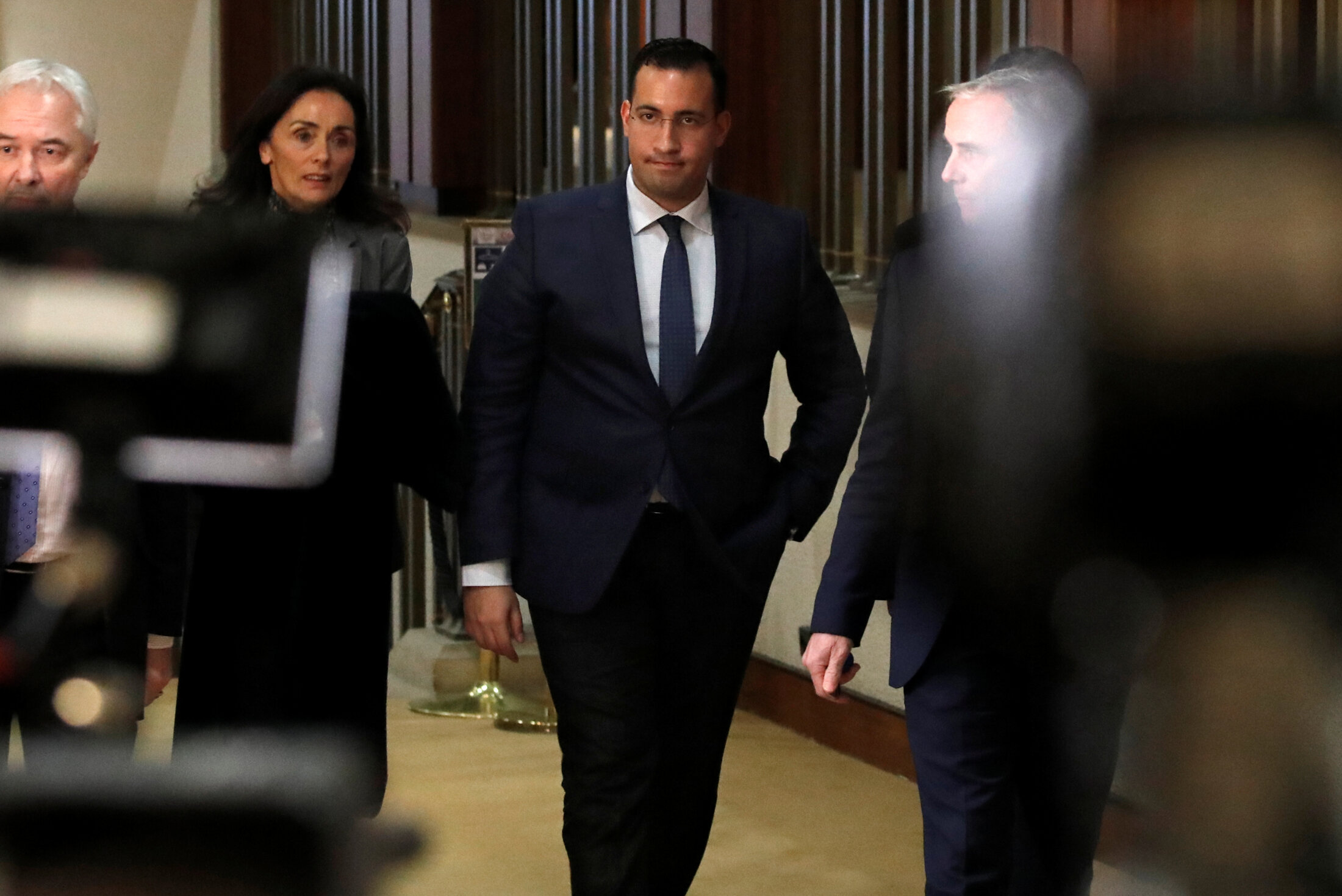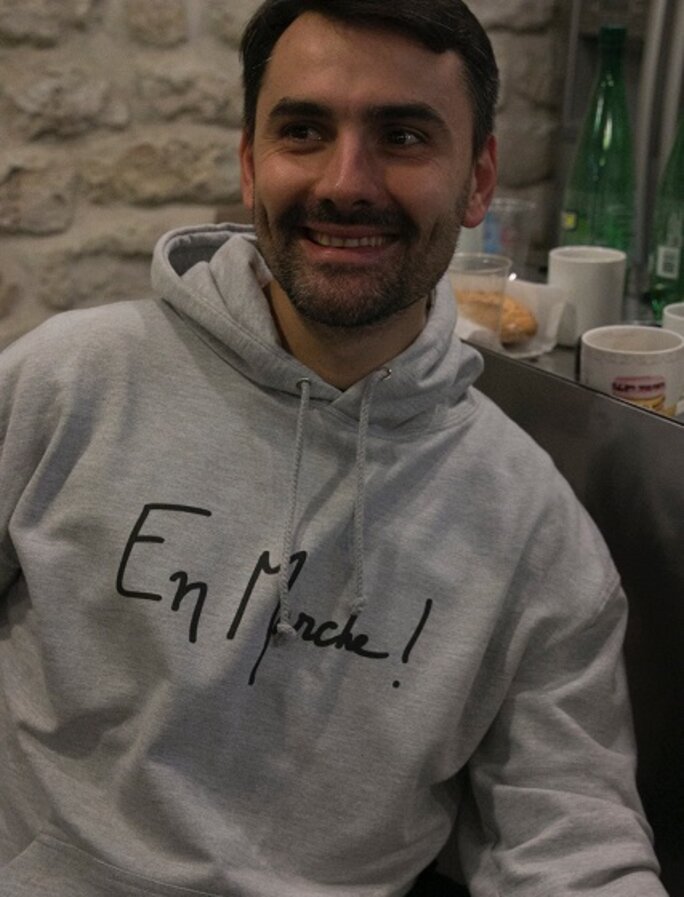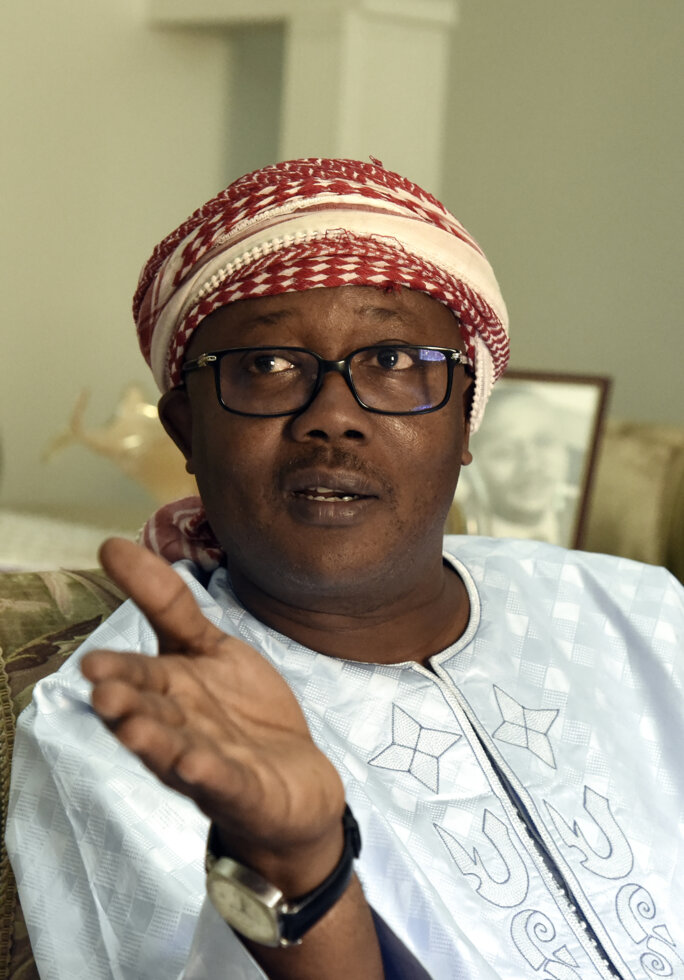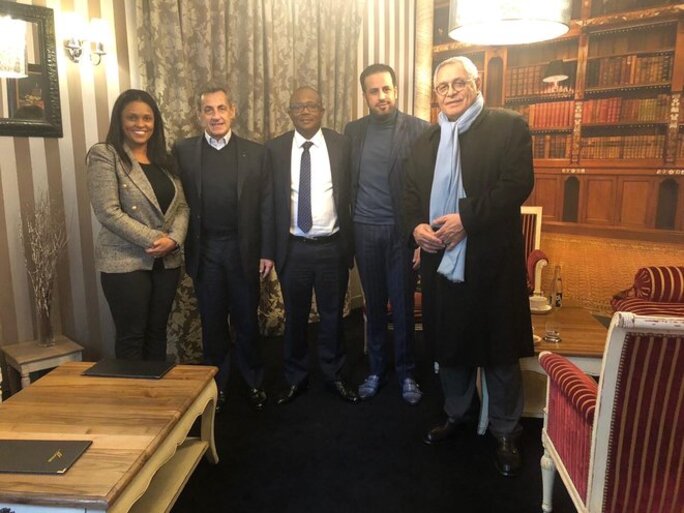President Emmanuel Macron's disgraced former security aide had a secret meeting with an African head of state in the company of a senior current official at the Élysée, Mediapart can reveal. The revelation casts doubt on repeated claims by the French presidency that Benalla – who was sacked in July 2018 after he was filmed beating up protesters at a May Day demonstration in Paris – no longer has any links with the Élysée.
The Élysée official with whom Benalla met the president of Guinea-Bissau at a Paris hotel in May this year was Ludovic Chaker, a former soldier who in 2016 was the first general secretary of En Marche! This was the movement used by Emmanuel Macron to build support for his successful candidacy to be president. Chaker's name has already been linked with the Benalla saga, in relation to the disappearance of a safe from the security aide's home after the latter's sacking. Chaker, a former soldier in the 44th infantry regiment who is reportedly close to French intelligence circles, was, like Benalla, one of the first key players in the movement that helped propel Macron into power.

Enlargement : Illustration 1

Together the pair met General Umaro Sissoco Embaló, president of Guinea-Bissau, while the latter was visiting the French capital. They met the African head of state at a room in the Sofitel Baltimore hotel near the Eiffel Tower on May 28th, soon after France ended its Coronavirus lockdown.
The president of Guinea-Bissau confirmed to Mediapart that he had met Benalla and Chaker, though he was vague about the exact content of their discussions. “Benalla is a young man I've known for years … Chaker, I've known him for a long time. He was in La République en Marche,” said General Embaló, who won a disputed presidential election held in the Portuguese-speaking West African country in December 2019.
Umaro Sissoco Embaló, who referred to Benalla and Chaker affectionately as “my young brothers”, insisted that the pair's visit to see him in the hotel was purely of a “friendly” nature. He said: “I had Covid, which nearly killed me. If they hadn't come to see me when I was ill I would have been angry.”
The Guinea-Bissau leader also insisted that Alexandre Benalla had not put himself forward as a representative of President Emmanuel Macron.
Mediapart understands that the diplomatic section at the Élysée Palace was not informed of the meeting between Benalla, Chaker and Embaló, either in advance or afterwards.
The fact that Benalla met a foreign dignitary in this way, with a member of the French presidential staff, will inevitably raise questions as to whether a form of parallel diplomacy is taking place, or whether some business project is being pursued using the Élysée as cover.

The Élysée did not respond to Mediapart's questions on the meeting.
Apart from those people directly involved, no one knows the precise context of the Benalla and Chaker meeting. Emmanuel Macron's own advisor on Africa, Franck Paris, also met the Guinea-Bissau president during his stay in the French capital. Umaro Sissoco Embaló's visit also attracted the interest of officials at France's Ministry of Defence, with the investigative weekly Le Canard Enchaîné reporting that two officials were spotted hot on his heels on May 29th.
Ludovic Chaker's lawyer Samuel Sauphanor said his client did not wish to comment.
It was Chaker, who at the time was still a lieutenant in the French Army reserves, who recruited Alexandre Benalla into the En Marche! movement in the summer of 2016. Chaker apparently had a high regard for the latter's abilities in personal security issues. After the presidential election in 2017 Chaker joined the presidential military section at the Élysée under Admiral Bernard Rogel, who has since been replaced by Admiral Jean-Philippe Rolland.
In November 2018 Ludovic Chaker told Mediapart that he had “had a coffee” with Benalla on “several occasions” after the latter's removal from the Élysée some three months earlier. He explained at the time: “[It was] to make sure that he was all right and to talk about the affair [editor's note, Benalla's sacking from the Élysée] in an informal way.”
In September 2018, and at Benalla's express request, Chaker also met with the Franco-Israeli businessman Philippe Hababou Solomon, to discuss issues relating to the Central African Republic.
Benalla did not respond to Mediapart's requests for a comment.
After Alexandre Benalla left the Élysée the ethical body that oversees the departure of public officials into the private sector, the Commission de Déontologie de la Fonction Publique (CDFP), forbade him from having any professional dealings with his former colleagues at the Élysée and with French security services and overseas authorities for three years, to August 1st 2021.
In June this year Benalla told Mediapart that he “fully” respected the CDFP's ruling by not working for the “public sector” or for “national clients in France” but that instead he worked “internationally” and only for “private individuals or organisations”. But he added: “...in a year I'll again be able to speak with and make commercial propositions to foreign public state entities.” Benalla said at the time he still kept up contacts that were made “before the Élysée” and which were maintained with “foreign heads of state” on a “personal level” and which had “no link with and impact on professional [matters]”.
The Chad connection

Enlargement : Illustration 3

Alexandre Benalla's May meeting with General Embaló bears similarities with the former presidential security aide's round of meetings that he held in the winter of of 2018, just months after he left the Élysée. Benalla went on a number of foreign trips, meeting representatives of autocratic African regimes in particular, while travelling on the diplomatic passport that he had not returned to the Élysée.
He later set up an Africa-focussed security and economic intelligence company which aims to have an annual turnover of “300 to 500 million euros” within ten years.
The African newsletter La Lettre du Continent revealed – and Le Monde also confirmed – that on December 5th 2018 Alexandre Benalla had a meeting with the Chad president Idriss Déby, who has ruled that country with French support for 30 years. He also met the president's brother Oumar Déby who is the head of Chad’s Directorate-General of Strategic Reserves (DGRS). Just ten days later Emmanuel Macron himself went on an official visit to Chad.
“Emmanuel Macron insisted on making known to Idriss Déby … that this person [Benalla] was in no manner an unofficial or official intermediary,” the Élysée said in a statement at the time, adding that the French presidency had “no further contact of any sort” with Alexandre Benalla.
Later, in a letter dated December 22nd, Macron’s cabinet chief Patrick Strzoda wrote to Benalla demanding that he gave “all pertinent information” about “eventual personal and private missions” that he may have “exercised or prepared as a consultant”.
A year later, in September 2019, a journalist from Le Monde came across Macron's former security aide in a Paris hotel as he made his way to interview the president of the Central African Republic Faustin-Archange Touadéra. When questioned about this, the African head of state sought to defuse the situation. “Did you meet him in my suite?” he asked the journalist. “I'm in an hotel and I don't know what goes on outside, in the corridors or elsewhere.”
What has become clear is that, since his departure from the Élysée, Alexandre Benalla has nurtured his global network of contacts in business and international affairs. This process has been helped by his increasing closeness to the Franco-Moroccan businessman Kamel Benali. The latter can be seen with the new president of Guinea-Bissau and with former French president Nicolas Sarkozy in Paris in this photo below, dated January 22nd 2020, which has been obtained by Mediapart.

Enlargement : Illustration 4

General Embaló was meeting the former French head of state that day with lawyer Robert Bourgi, one of the best-known figures in the world of Franco-African trade and relations.
Benali, aged 45, told Mediapart that he was an intermediary for foreign companies and authorities, that he was based in Iraq and also active in Sub-Saharan Africa and in central Africa. He said that he sees Benalla “regularly” and has known him for “nearly ten years”. He said: “I knew him when he started in security, he's from the same town as me. His wife is my wife's best friend. He's like a younger brother, I was always there for him, well before he was known. I saw him before [editor's note, his time at the Élysée], during and I see him afterwards.” Benali continued: “I don't talk about business with him, he's in security and I'm in business. When we see each other we have a glass, we eat together, we have other interests, interests that we share.”
The Franco-Moroccan businessman said that he was invited to the meeting with Nicolas Sarkozy by his “friend”, President Embaló, whom he knew from when the politician was Guinea-Bissau's prime minister. Benali spoke of a “friendly meeting” in which he “established contacts” with the former French president at “Robert Bourgi's initiative”.
“Mr Sarkozy came by out of friendship. When he was president I was minister of state. We had a very good relationship,” General Embaló told Mediapart. The Guinea-Bissau president, who has in the past spent time with Bashir Saleh, the former chief of staff of the late Libyan ruler Muammar Gaddafi and a key figure in the claims that Libya funded Sarkozy's 2007 election campaign, denied that the former French head of state had visited him in his capacity as a director of the French hotel chain Accor. “No, no, it was purely friendly,” he said of the meeting.
Nicolas Sarkozy did not respond to a request for a comment.
------------------------------------------------------------------------------
If you have information of public interest you would like to pass on to Mediapart for investigation you can contact us at this email address: enquete@mediapart.fr. If you wish to send us documents for our scrutiny via our highly secure platform please go to https://www.frenchleaks.fr/ which is presented in both English and French.
------------------------------------------------------------------------------
- The French version of this article can be found here.
English version by Michael Streeter


